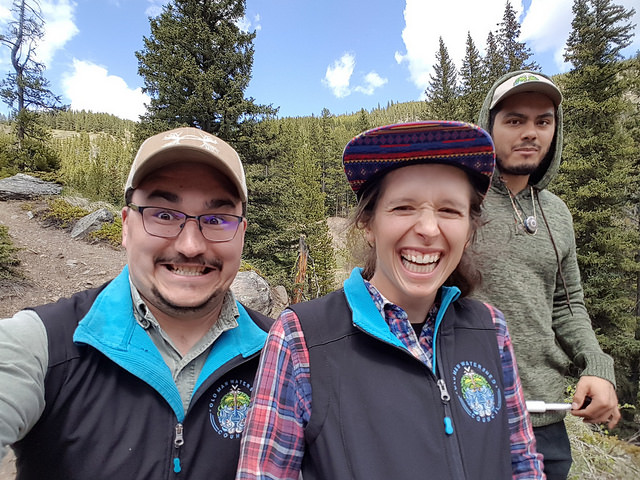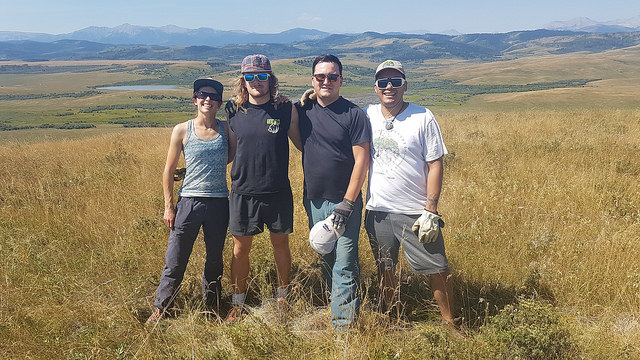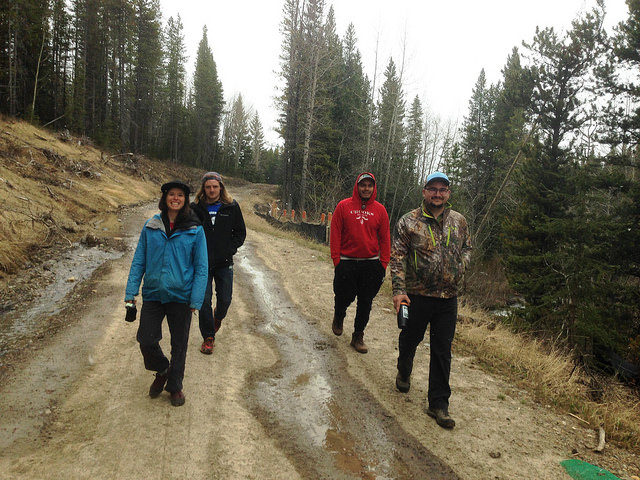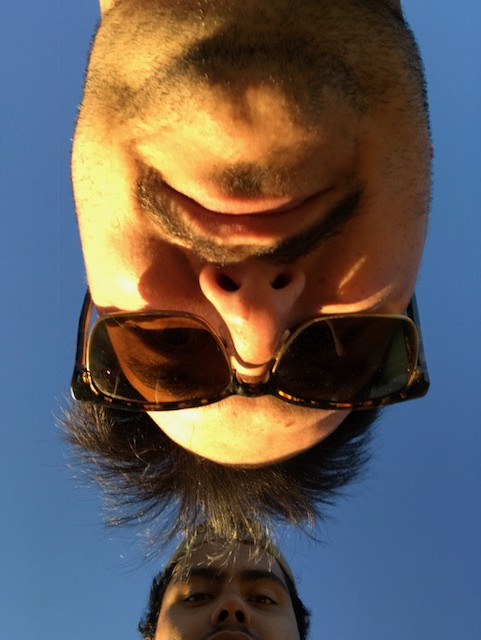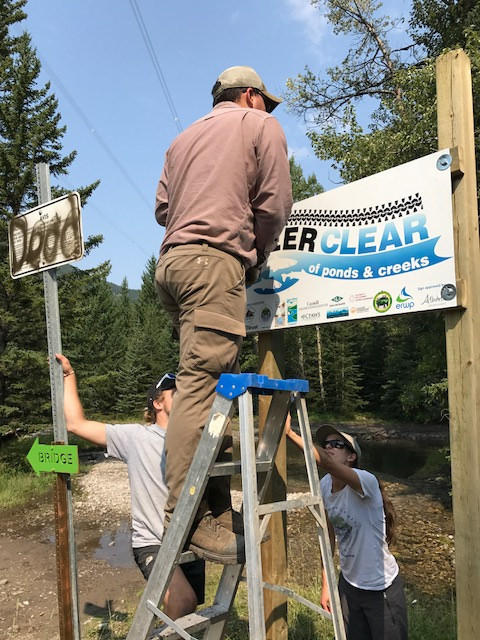That’s it that’s all folks! The OWC outreach assistants have completed their summer term and are on to whatever is next for each of them. Over the course of the summer we encountered a variety of people with wide-ranging opinions, and had great conversations with backcountry users of many different stripes.
Hopefully some of our conversations made a difference or at least sparked a thought process that will lead to increased stewardship in the future. Every conversation counts! We thought the best way to recap our summer would be to ask each member of the outreach team for their personal impressions, thoughts, feelings, and memories.
Q: What did you see/hear out in the backcountry this summer?
Francisco:
I heard from a lot of people that really care about the backcountry!
Nata:
We saw a variety of activities and types of people (quadders, hikers, anglers; families, groups of friends; old and young). We heard a variety of responses as well, but regardless of their opinion most people we talked to were passionate about the area, and associated major personal value with the region.
Reuben:
Heard a mixture of responses, though a general theme of passion for the serenity of the outdoors. People want to maintain access and continue to recreate in Alberta’s back yard.
Rob:
The majority of the folks we spoke with this summer appeared to care deeply about the land. They want to maintain access to the backcountry and are often willing to sacrifice their time and money to achieve that.
Q: What kind of impact do you think you had?
Francisco:
Our work helped facilitate communication of watershed health in the backcountry (putting ideas in people's heads).
Nata:
Each person that we engaged with and encouraged to think about their surroundings and land makes a difference. The watershed is the responsibility of everyone who lives, works, and recreates in the area, and I hope that we helped at least a few people see the positive impact they are able to have and the ways in which they are able to contribute.
Reuben:
I think that the Engaging Recreationists program will have a positive impact on the community, encouraging conversation around watershed quality and health. As we talk to stakeholders, we help to educate on how recreation affects the watershed and what that means for people downstream.
Rob:
I am hoping that we have taught people how to think about human activities on the land from a watershed perspective. The more that people consider how their actions can affect people, wildlife, and watershed health downstream the better.
Q: Which of your job-related activities was your favourite?
Francisco:
Public outreach! We got to see the joy people got from learning about our watershed.
Nata:
Public outreach events, such as some of our more well-attended point duties, or other events around town were my favourite. In the case of point duties, the opportunity to see the excitement of kids learning about the world around them and watching them make connections is very rewarding.
Reuben:
I loved working with Southern Alberta Land Trust Society (SALTS) just because of the work they’re doing, encouraging landowners to work towards a more sustainable watershed. It only takes one positive influence to make a difference.
Rob:
I really enjoyed our partnership with SALTS. It was wonderful to help out such a great organization and meet many landowners who are deeply committed to watershed stewardship and health.
Q: What was the highlight / most memorable moment of the summer?
Francisco:
Rob jumping into the river in his Carhartts, and being able to see all the plants grow through all of their stages through out the summer.
Nata:
Between working and camp duties (cooking, cleaning, set-up, take down), we did have some fun and memorable moments. We had some great frisbee tournaments, found some beautiful swimming holes, and enjoyable nights around the campfire before the fire ban. A specific memorable moment is when Rob jumped in the river in his Carhartts, but you’ll have to ask him the details of that story!
Reuben
Chucking bugs, catching gnarly fish.
Rob:
I would probably have to say the streambank restoration event we partnered with Trout Unlimited Canada for. It was a great example of a community-led, grassroots stewardship event.
Q: What’s next? What was something new you learned or skills you developed that will help you in your career?
Francisco:
I’m going to U of L to get a biology degree. I learned how to deal with hostile people, how to communicate a point that people might not agree with, showing that you understand somebody's point without agreeing with them. Working in remote locations for extended periods of time.
Nata:
In the winter I work as a ski patroller at Castle Mountain. In the immediate future I’ll be working there on the brush crew, and travelling to South America for a ski trip for a few weeks.
I learned many useful skills geared towards defusing potential hostile or aggressive situations, and expanded my ability to empathize with the opinions of others. I also learned to read the ingredients before feeding something to a coworker with allergies.
Reuben:
I’m heading out to Ontario to finish off my Kinesiology Honours degree. I had great experiences living with three other people all summer as well as networking through the community.
Rob:
I will be continuing with the Oldman Watershed Council for a bit longer. As team lead, I really got the chance to further develop my leadership skills and grow as a supervisor.
Q: Write your own question and response!
Francisco:
Q: Favorite activity to do in the backcountry ?
A: Cliff jumping every chance we got… pretty much every day.
Nata:
Q: Best camping meal?
A: We had a lot of good ones; pork in the dutch oven was a highlight for me
Reuben:
Q: Who’s the OWC poster boy?
A: Self explanatory.
Rob:
Q: Favourite spot in the headwaters?
A: The front range canyons of the Castle Wildland Park.
Q: Final message to folks in the watershed?
Francisco:
Remember to think how your actions will impact our watershed; we are all downstream.
Nata:
The watershed is for all of us to use and all of us to take care of. We can all co-exist, as long as we all do so responsibly and are willing to co-exist.
Reuben:
If we want to avoid losing access and losing huge amounts of tax dollars into cleanup and restoration, we need to create a conversation about watershed health now. We all depend on the watershed for clean, clear drinking water and we can all take actions for better sustainability. It’s up to us to make a difference now before drastic measures need to be taken.
Rob:
If we ever want to have a healthy, resilient watershed we need to bring other people up, not put them down. Every positive action we have on the watershed is important, and we all need to support one another in our common goal of maintaining and restoring our wild spaces in the Oldman Watershed. Even if we disagree on how to get there, I think we all want the same thing: a healthy watershed that will support both the people and ecosystems that depend on it.
Read about our very first weekend here. This feels like it was ages ago!
A week in the life of an Outreach Assistant as told by Chico.
Thanks for reading, and thanks everyone for your support over the summer, and your continued support into the future.






























